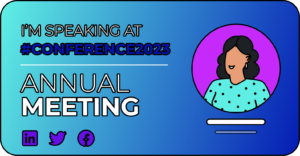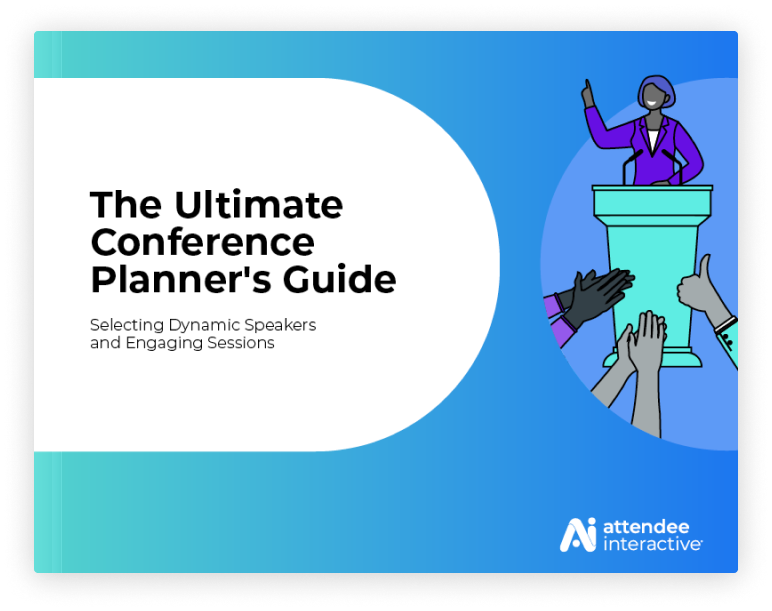When planning events, the speaker invitation letter is a crucial element that organizers need to focus on to build the perfect conference program.
The individuals who take the stage at your conference can make or break the entire event because they bring expertise, insight, and a unique perspective that can elevate your conference from good to exceptional. However, reaching out to potential panelists and special guest speakers is not always an easy endeavor.
The process requires a carefully crafted invitation letter that not only conveys the value of your event but also entices them to be a part of it. Here, we explore the art of creating a successful invitation letter for these distinguished participants, guiding you through the key considerations, best practices, and essential elements of a well-structured conference program.

Speaker invitation letter significance
A well-crafted invitation letter for event guest speakers is more than just a formality; it’s the bridge that connects your conference with influential voices in the industry. This type of invitation is not for every session but is reserved for critical moments, such as assembling panels or inviting renowned experts to share their knowledge.
Ultimately, it’s an opportunity to bring thought leaders and innovators to your event, creating an atmosphere of knowledge exchange and networking that can have a lasting impact.
We can’t stress enough the importance of personalization, so be sure to tailor your formal invitation letter to each potential speaker. Address their specific accomplishments and why their insights would be invaluable to your event. Highlight how their participation will contribute to the overall conference experience.
To give you a better idea of how to write an invitation letter, click here to see a sample guest speaker invitation letter.
Finding the right speaker
Selecting the right speakers for your event is crucial. While you want amazing voices animating your event, you also need to consider practical implications like the fact that in 2023, speaker fees began outpacing event budgets.
That’s why it’s a good idea to look beyond the obvious choices and consider creative avenues for finding great speakers. You can also utilize event planning software with speaker management functionality to build your own speaker’s bureau.
By using the software’s historical data from attendees’ surveys, you identify speakers who align with your audience’s preferences and interests.

5 Topics to include in your speaker invitation letter
1. Your event goals and value proposition
Before you can find the ideal panelist or speaker, clarify your event’s value proposition, goals, and objectives. This clarity is vital when introducing the event to potential speakers.
To ensure you relay the right message, be sure to highlight what sets your conference apart and why it’s a must-attend event. Likewise, communicate the benefits of speaking at your event, such as the opportunity to reach a highly targeted and engaged audience.
Once you’ve identified the value proposition of your event, it’s time to craft the abstract.
2. Session abstract
The session abstract is the window through which speakers glimpse the content and focus of your event, so you need to guarantee that it’s clear, concise, and compelling.
The key components of an abstract include a concise summary of the session, the main topics to be covered, and the takeaway value for attendees. After creating the draft, make sure it aligns with the overall theme of your event.
Should you require assistance, you can use event planning software with abstract management functionality to streamline the process and keep your team aligned.
3. Speaker benefits and recognition
Convincing speakers to participate requires more than just a well-crafted invitation letter. More importantly, you must highlight the advantages they’ll gain, such as the opportunity to network with other industry leaders, gain exposure to a wider audience, and solidify their position as a thought leader.
At the end of the letter, express your appreciation for their contribution and reassure them that their insights are highly valued.
4. Essential event details and logistics
Remember that a successful conference program hinges on clear communication of critical event details. That said, include the date, time, location, and session format in your invitation letter.
If the speakers need to travel, provide information about travel arrangements, accommodations, and any other logistical details that would ease their participation. Doing so will guarantee a smooth and hassle-free experience for your guests.
5. A persuasive call-to-action
After establishing all the important details, create a compelling call to action that encourages prompt responses from potential speakers. Maintain a courteous tone while emphasizing the urgency of the opportunity, express your enthusiasm to have them as part of the event, and outline the next steps for them to confirm their participation.
3 keys to managing the speaker relationship
The relationship with your event speakers is a dynamic and ongoing process that extends far beyond the initial invitation.
Once you’ve successfully secured your panelists and special guest speakers, it’s essential to nurture this connection and ensure that they have the necessary support to shine at your conference. Here’s a comprehensive guide on managing the speaker relationship to create a seamless and memorable event.
1. Communication
Maintaining open lines of communication is crucial. Establish a clear channel for speakers to reach out with any questions, concerns, or logistical needs. Promptly respond to their inquiries and provide detailed information. Additionally, keep them informed about any updates or changes to the event schedule or format.
2. Pre-Event Preparation
Help your speakers prepare for their session by providing resources and guidance. Share the agenda, session format, and any specific guidelines for presentations. Offer assistance with creating impactful slide decks, refining their content, and rehearsing their delivery. A prepared and confident speaker enhances the overall conference experience.
3. Support and Logistics
Ensure that speakers have everything they need to focus on their presentation. Coordinate technical requirements, such as audiovisual equipment, microphones, and stage setup. If they need special accommodation or materials for their session, be proactive in arranging them.

Recognition and Appreciation
During the event, acknowledge your speakers’ contributions. Give them a proper introduction, highlighting their accomplishments and expertise. Also, provide a dedicated space for speaker bios and information. After their segment, offer tokens of appreciation, such as certificates or small gifts, as a gesture of gratitude for their time and effort.
Post-Event Follow-Up
Don’t let the relationship end when the event concludes. Follow up with your speakers after the conference. Express your gratitude for their involvement and inquire about their experience.
Gather feedback on the event, including their thoughts on what went well and areas for improvement. This information not only helps you refine future events but also strengthens the connection with your speakers.
In managing the speaker relationship, it’s essential to be attentive to their needs, respectful of their time, and proactive in ensuring they have a positive experience. Remember, the speakers you invite are valuable assets to your event, and by nurturing this relationship, you create a community of influencers who may become long-term advocates for your conference.
FAQs
Interested in learning more about how to find, invite, and secure the right speakers for your event? Take a look at the FAQs below.
How do you write an invitation to speak?
Begin with a personalized introduction, explain the value of your event, highlight the benefits of speaking, provide essential details, and create a compelling call to action.
How to write a letter of invitation to be a guest speaker?
Tailor the letter to the potential speaker, clearly explain the value of their participation, and provide all necessary information for them to make an informed decision.
How do you accept an invitation to speak at an event?
Express gratitude for the invitation, confirm your availability, and ask any clarifying questions if needed.
How do you ask to speak at a conference?
Present your credentials, explain how your expertise aligns with the conference theme, and express your enthusiasm for contributing.
Wrapping Up
In the end, crafting a letter of invitation for panelists and special guest speakers is a blend of art and strategy. It’s about conveying the unique value of your event, understanding the needs and aspirations of potential speakers, and creating a partnership that benefits everyone involved.
Keep in mind that a well-structured conference program, supported by persuasive and personalized invitations, can set the stage for a truly memorable and impactful event.



